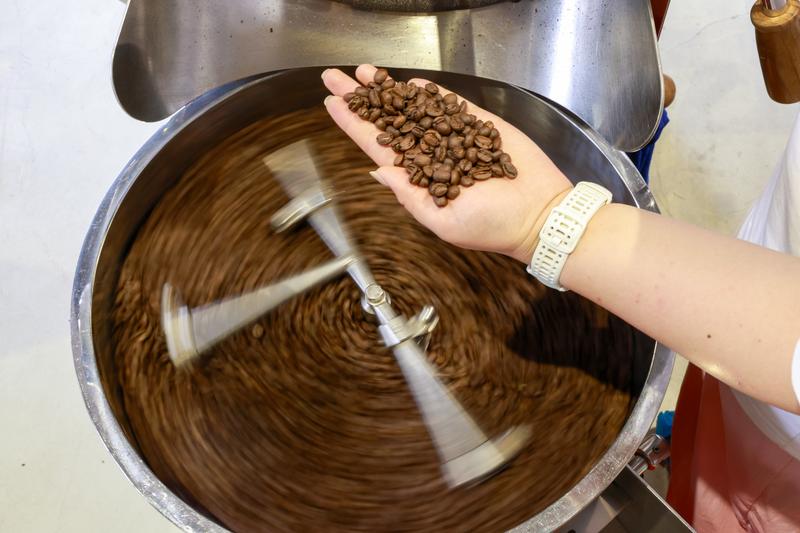China's evolving coffee industry welcomes new 'flavor alchemists'


KUNMING - The challenge appeared almost impossible. It required distilling into a single cup of coffee the spirit of China's revolutionary struggle, meaning a fusion of the sacrifice, resilience and hope that defined those momentous years.
For Zhang Shaoxiong, a technician sweltering in protective gear at Yunnan Comeng Industry Co Ltd (Comeng Coffee) in Baoshan, Southwest China's Yunnan province, this quest meant sifting through dozens of locally produced beans, conducting over 100 painstaking blending trials and tweaking roasting curves.
His ultimate creation - named The Age of Awakening, is a richly layered, mellow yet profound thematic coffee that resonates emotionally and is much more than just a co-branded release by the Baoshan Coffee Association and the Memorial Hall of the First National Congress of the Communist Party of China in Shanghai last year.
This blend of coffee also symbolizes the precision now demanded by China's soaring coffee culture, formalized in July by a new profession - a state-certified coffee processing technician.
In a nation famed for tea, a new generation of technical artisans now manipulates chemistry to turn humble coffee beans into liquid sonata, powering an industry surging toward a 1-trillion-yuan ($140 billion) valuation.
The task of a state-certified coffee processing technician, one of 17 new professions recognized by China's Ministry of Human Resources and Social Security, is officially defined with scientific rigor - they convert coffee cherries into green/roasted beans, final products or derivatives by operating coffee processing equipment.
The institutionalization of this profession demonstrates the maturation of China's coffee market and signals the sector's impending transition toward specialized, precision-oriented development. But to Zhang, what people see as simple roasting or grinding, is just the tip of the coffee iceberg. "Coffee processing technicians are actually multi-skilled flavor masters," he said.
"Our craft requires intimate knowledge of each bean's 'birth information,' razor-sharp sensory evaluation skills to dissect acidity, body and aftertaste across dozens of dimensions, and the ability to harness chemical reactions for targeted flavors," Zhang said, adding that rigorous quality control and data-driven analytics guarantee product consistency and safety.
The pinnacle of a coffee processing technician's craft lies in precision blending - harmonizing bean varieties to create profiles that balance technical excellence and emotional resonance, much like Zhang's iconic revolutionary roast.
This specialization drive, notably, isn't about boutique indulgence but rather economic necessity. China's coffee thirst is accelerating - per capita consumption frequency surged from 5.6 times annually in 2023 to 7 times in 2024, with annual per capita consumption rising to 22.24 cups, fueled by domestic brands and diversified palates, according to an industry development report released at the opening ceremony of the 2025 Shanghai International Coffee Culture Festival in late April.
The market ballooned to 789.3 billion yuan in 2024 and is projected to exceed 1 trillion yuan in 2025, data from market research firm iiMedia Research showed. There are more than 248,000 coffee-related enterprises operating across China, with new registrations jumping 16.8 percent year-on-year in the first half of 2025, statistics from the business information platform Tianyancha revealed.
Experts noted that as coffee consumption grows steadily, the industry's professionalization accelerates - evidenced by new specialized roles that naturally arise at this development stage. "China's coffee sector is booming with record enterprise registrations and investments," said Zhuang Shuai, a retail e-commerce expert and guest consultant for the China Chain Store & Franchise Association.
The coffee industry now faces talent gaps across its entire value chain from farm to finished product - with growing demand for skilled professionals, he noted.
Regions across the country are racing to address this shortage. In Yunnan's coffee heartland of Pu'er, a coffee technician vocational training program has been established to upskill workers. Meanwhile, Jiangmen and Foshan in South China's Guangdong province are piloting an innovative "one test, multiple certifications" system to streamline professional credentialing. Further east, Kunshan in Jiangsu province is capitalizing on its booming "village café" trend by hosting barista competitions.
Wang Lijun, general manager of Comeng Coffee, underscored the importance of developing and optimizing the vocational training system for skilled professionals.
"We need standardized training covering green bean science, roasting and sensory evaluation -- all aligned with market demands," Wang said. "Only then can technical artisans drive industry growth."




































